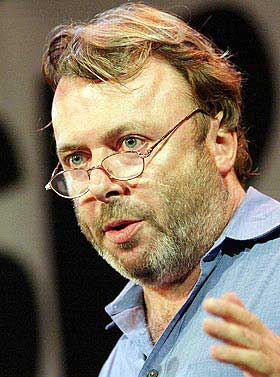New Atheist Rebuttals (5)
Hitchens’ Childhood Epiphany
Christopher Hitchens begins his screed against God and religion by recounting his awakening, as a 9-year old “insufferable little intellectual,” to the “overreaching” comment of his grade school teacher, Mrs. Watts. The statement that is burned into Hitchens’ memory from that day is this: In an attempt to …
fuse her two roles as nature instructor and Bible teacher, she said, ‘So you see, children, how powerful and generous God is. He has made all the trees and grass to be green, which is exactly the color that is most restful to the eyes. Imagine if instead, the vegetation was all purple, or orange, how awful that would be.’
Assertion: I have to note that Hitchens is charitable in his assessment of Mrs. Watts. His only description of her is as a kind and loving woman with sincere motives. But Hitchens’ memory of this incident is that he was “appalled” by what she said. Knowing nothing of the argument from design, the claims of Darwinian Evolution, or any of the related issues, Hitchens remembers that he “simply knew, almost as if [he] had privileged access to a higher authority, that [his] teacher had managed to get everything wrong in just two sentences. The eyes were adjusted to nature, and not the other way around.”
This epiphany led him to notice other “oddities” over the next few years, such as:
- If God is the creator of all things, why should we praise him incessantly for doing what came to him naturally?
- If Jesus could heal a blind person, why not heal blindness?
- With all this continual prayer, why no result?
- Why was the subject of sex considered so toxic? (Note: remember this one for later!)
Response: If Hitchens is not embellishing (and I will assume he is not), you have to admit that these are some pretty precocious observations for a nine to thirteen year-old to make. But what interests me is not only that Hitchens readily admits that these are “childish” and “commonplace” objections — but that he still holds them.
Each of the four bulleted items above is related to either the “problem of evil” or centers on the fact that the God to whom theists appeal is not the kind of God Hitchens would like him to be. Each of these come out in his book in more sophisticated, but no less defensible, terms. He just can’t bring himself to believe in a God that would make the world this way. None of us “like” some of these things. But for such an intelligent person, you would think that he would realize that there are legitimate reasons to see the following …
- A perfectly holy God is perfectly within his “rights” to seek praise and we, being imperfect creations of his, would have no reason to deny it — beyond our own overblown sense of self-worth or rebellion.
- Perhaps God has a reason for allowing blindness. Sight is a gift. It is not required for survival. Easy for me to say of course because neither I, nor anyone I know, is blind — but there are many reasons that someone could be blind. None of them, however, hinge on the reality of the existence of a loving God.
- How does Hitchens know there is “no result” to prayer? What if two people are praying for contradictory results, with insincere motivation, or for answers that would be against God’s sovereign will? The truth is that neither Hitchens, nor anyone else, knows whether there are results to prayer, or whether there will be results in the future.
- Toxic sex? There is nothing in the Bible that deems sex “toxic.” Has Hitchens ever read Song of Solomon, for heaven’s sake?! What can be toxic are the results that follow from immoral and/or aberrant sexual behavior. That can be toxic … and for many legitimate reasons.
I’m trying to keep this short but I would also like to address Hitchens’ original disgust with his teacher’s assertion that the color of vegetation was made to be pleasing to the human eye … and Hitchen’s counter that it is obviously and exactly the other way around.
I won’t argue for or against the design of the human eye here. But what I would like to point out is an insight that J. P. Moreland brought to my attention in class several years ago at Biola University … There is no color in an electron, or a proton, or an atom, or in any of the bits of matter that make up this universe. So the “stuff” that makes up the universe is colorless. Why then, does anything have color at all? It is not a requirement for existence, that’s for sure. Things have color because they emit, or reflect certain wavelengths of light. But a wavelength is just an arbitrary unit of measurement assigned by scientists. Wavelengths don’t have “color.”
Color, in other words, seems to be an arbitrary feature of the universe with no reason for its existence. “Maybe,” J. P. said, “God just added color to the creation to make it more enjoyable for us.”
Now Hitchens would never accept that as an explanation. And I wouldn’t offer it as a defense of the design of my eyes, or the vegetation I like to look at. But it is interesting to ponder. And I bet Mrs. Watts would think so too.





